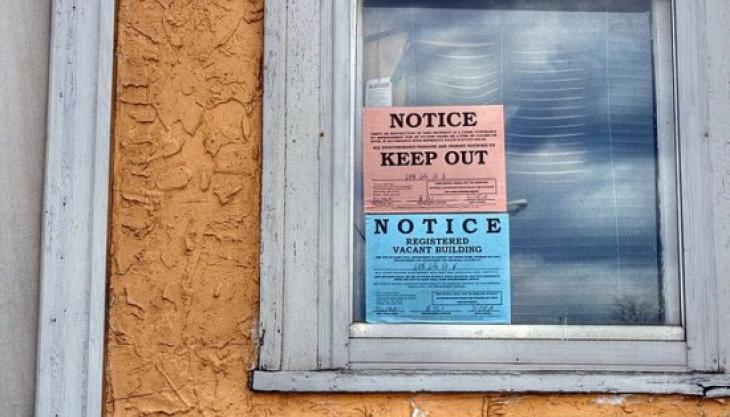What Are the Tax Consequences of Foreclosure and How Can You Avoid Them?
Submitted by Rachel R on Tue, 01/06/2015 - 2:29pm

How can foreclosure activities affect your income taxes?
Image source: Flickr user Teresa Boardman
If you're behind on your mortgage payments and have been threatened with foreclosure, you may be looking for options to help you. One of the things you need to be aware of is that several options related to foreclosure have tax consequences that can be quite significant. If you're already in debt, you don't want to get deeper in over your head. Here's what you need to know about how foreclosure, short sales and other options that come with falling behind on your mortgage can complicate your tax situation and how these can be mitigated or avoided to save you money.
#1 What happens with a foreclosure?
A foreclosure occurs when you fail to make payments on your property and the lender forces it into an auction sale. At the auction sale, it's usually the lender themselves that purchase the property. This protects the lender from taking a loss. When the lender takes your property in this manner, the mortgage associated with the property is also charged off because the asset was recovered. Often, when debts are forgiven, the lender will issue a 1099-C (cancellation of debt form) which makes the amount of debt written off taxable. You can quickly see how this could complicate your life.
The Mortgage Forgiveness Debt Relief Act of 2007 has been extended a number of times and now includes foreclosures up through 2014 (and may be further extended). It allows for the non-taxable discharge of mortgage debt when you've lowered your debt through mortgage restructuring or shed the debt and property through a foreclosure. So long as this act continues to be expanded year by year, you shouldn't face any tax implications from foreclosure. However, if the act does set a firm end date and sticks to it, the written-off debt may be taxable.
#2 What happens with a short sale?
Short sales are an option often taken by troubled homeowners that can no longer afford their mortgage payments. These sales are usually a last ditch alternative to a foreclosure and can be a win-win for the borrower and the lender, but can also result in potential tax consequences. Sometimes lenders may allow a short sale in an amount that's less than the mortgage balance owed and this is where the trouble starts.
For instance, if you owe $180,000 on your mortgage and your lender allows a short sale of $150,000, this leaves a deficit of $30,000 that could trigger a 1099-C if they write it off rather than pursuing you for the debt. As it stands now, the Mortgage Forgiveness Debt Relief Act may cover this deficiency amount just like it would with a foreclosure. Through 2014, the act may help you avoid tax consequences, but any short sales or foreclosures in 2015 may not receive this shelter.
#3 What happens with forgiven debt in a bankruptcy?
If you find yourself in a situation where you're facing tax consequences from a short sale or foreclosure, bankruptcy can be a “get out of tax” option. If you've had a mortgage debt canceled in a foreclosure or a short sale or you think this may be coming your way in 2015, you may not have the option of excluding the forgiven debt from your income on your 2015 taxes if the Mortgage Forgiveness Debt Relief Act is not extended.
However, one way you can avoid the tax consequences of forgiven debt is to file Chapter 7 bankruptcy. If you've had other debts charged off, including credit cards, medical bills or remaining car loan balances, and have been sent a Form 1099-C (or are anticipating you'll be sent one or more 1099-Cs), bankruptcy may be the best way to avoid the tax implications. If you've lost your home to a foreclosure or had to pursue a short sale because you can't afford your home, you've likely got other debt issues, as well. Bankruptcy may address many of these to get you a financial fresh start.
To find out more about how bankruptcy can help you dig out of debt, contact the North Carolina bankruptcy experts at the law offices of John T Orcutt today for a free consultation to find out if you should pursue a short sale, let a foreclosure move forward, delay your foreclosure or pursue other options to get you the relief you need.
Debts Hurt! Got debt? Need help? Get started below!
Serving All of North Carolina
- Bankruptcy Attorneys Raleigh NC (North)
- Bankruptcy Attorney Fayetteville NC
- Bankruptcy Attorney Durham NC
- Bankruptcy Attorneys Wilson NC
- Bankruptcy Attorneys Greensboro NC
- Bankruptcy Attorneys Southport NC
- Bankruptcy Attorneys Wilmington NC
Bankruptcy Attorneys Raleigh NC (North)
6616 Six Forks Rd #203 Raleigh, NC 27615 North Carolina
Tel: (919) 847-9750

Bankruptcy Attorney Fayetteville NC
2711 Breezewood Ave Fayetteville, NC 28303 North Carolina
Tel: (910) 323-2972

Bankruptcy Attorney Durham NC
1738 Hillandale Rd Suite D Durham, NC 27705 North Carolina
Tel: (919) 286-1695


Bankruptcy Attorneys Greensboro NC
2100 W Cornwallis Dr. STE O Greensboro, NC 27408 North Carolina
Tel: (336) 542-5993

Bankruptcy Attorneys Southport NC
116 N Howe St. Suite A Southport, NC 28461 North Carolina
Tel: (910) 218-8682

Bankruptcy Attorneys Wilmington NC
116 N. Howe Street, Suite A Southport, NC 28461 North Carolina
Tel: (910) 447-2987
